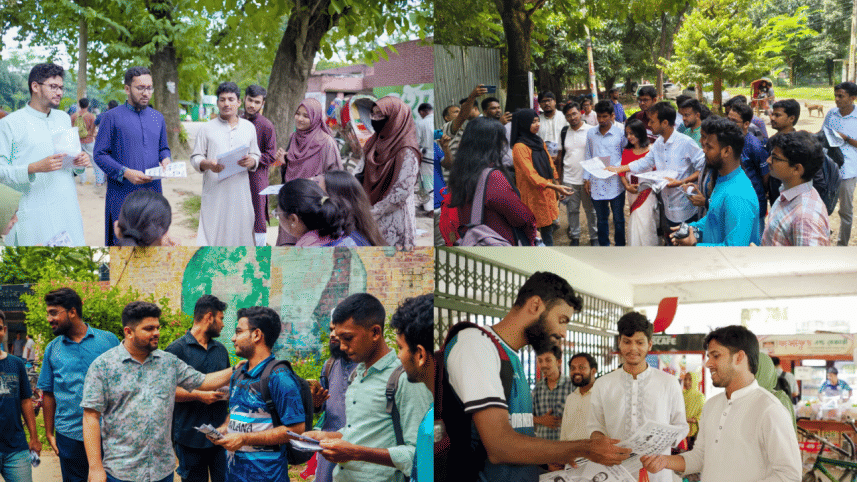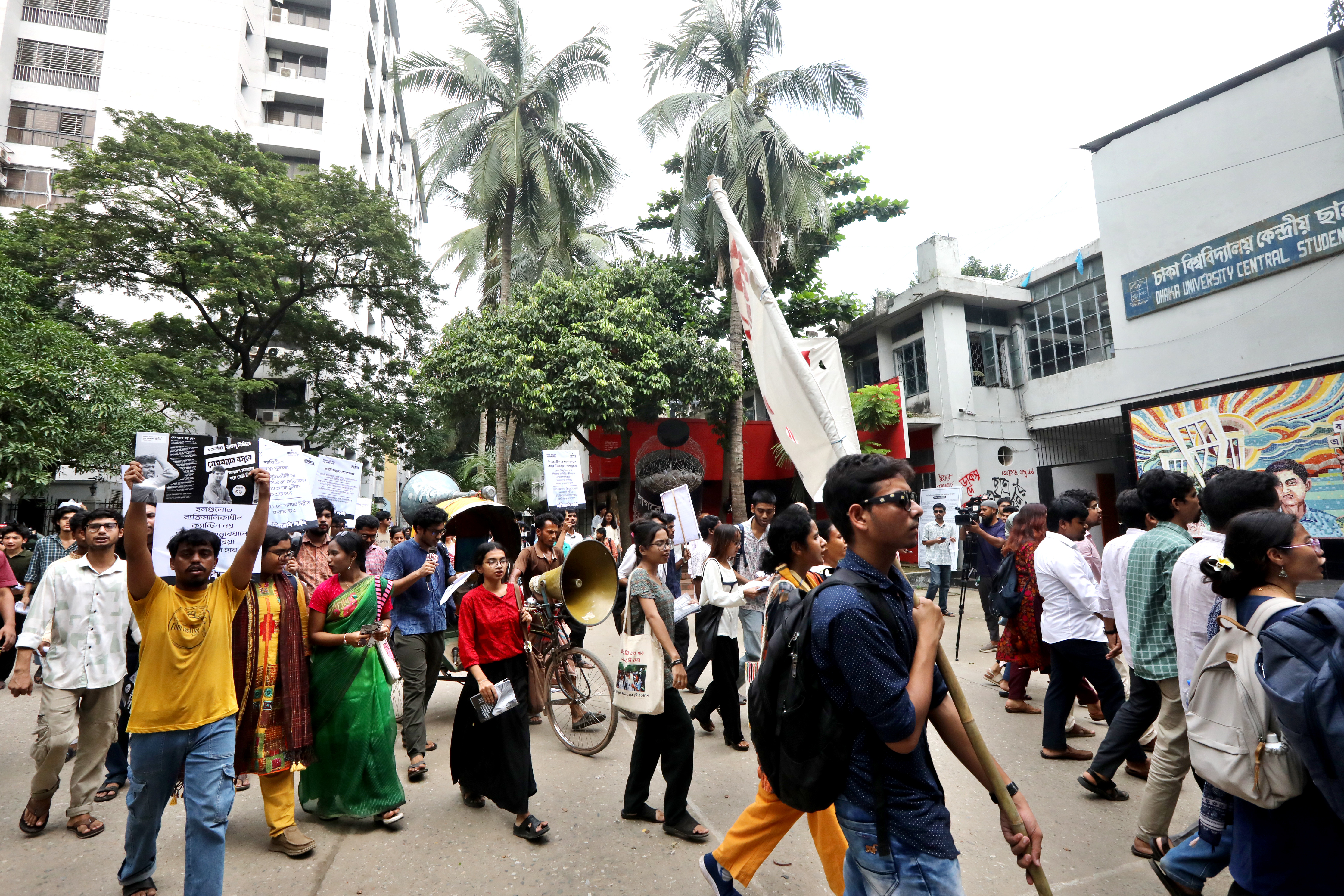Returning after 33 years, what difference will Jucsu make?

After over three decades, the Jahangirnagar University Central Students' Union (Jucsu) election is finally making a comeback. It was last held in 1992. If all goes as planned, the long-awaited polls will take place on Thursday, just two days after the Ducsu election, marking a rare moment when two of the country's oldest public universities are reviving their student unions almost in tandem (to be followed by others soon).
For those of us who studied at JU, this is both nostalgic and bittersweet. It's nostalgic because Jucsu was more than a student body; it was the beating heart of the campus, a platform where students' voices mattered and democratic culture thrived.
I still vividly remember an incident when I attended the university's annual senate meeting as a correspondent for this newspaper. The senate, by tradition, was a gathering of teachers, registered graduates, and five elected Jucsu representatives, who were entrusted with carrying the voices of students into that forum. But in the absence of Jucsu representatives, those seats lay empty, and with them, the voices of students disappeared from the discussion. Their concerns and problems, too, were left largely untouched.
That day, when a teacher of philosophy boldly placed a set of demands before the house on behalf of the students, a few journalists present in the press gallery instinctively broke into applause. It was unusual, perhaps even a protest against the silence where student voices ought to have been. Yet, those who clapped were politely asked to refrain from doing so, and reminded that this space was reserved for formal deliberation by participants.
Over the years, I have witnessed many protests demanding Jucsu elections. Students often staged demonstrations and pressed the administration to act. But in the end, those demands went unmet. Now that the long-overdue election is finally being held, many hope it would mark a fresh, proper start. This is where Thursday's election also carries a bittersweet tone, as its return is being overshadowed by the troubling realities of vacant seats, uncontested posts, and a stark underrepresentation of women.
During the July uprising last year, hundreds of female students actively took part in the movement, many playing vital roles. Moreover, nearly half of the Jucsu voters are women because of the 50-50 admission system at the university. The total registered voters stand at 11,919, almost evenly split between men (6,102) and women (5,817). A total of 620 candidates are contesting 340 posts across the central and hall unions, including 448 men and 172 women. For the 25 central union posts, 179 candidates are in the race—132 men and 45 women. The gaps in female representation are striking.
An analysis further shows that nearly 60 percent of hall posts are either uncontested or vacant. Out of 315 positions across 11 male and 10 female dormitories, 131 are uncontested and 68 remain vacant. According to a report by this daily, at least 10 female students alleged that cyberbullying, harassment, and the absence of a women-friendly political atmosphere are the main reasons behind their reluctance to join the polls. This is one of the barriers that must be removed if we are to build an inclusive student union that inspires change in the wider society as well.
This year's polls will feature contests among eight panels, including Jatiotabadi Chatradal (JCD), Islami Chhatrashibir, Bangladesh Ganatantrik Chhatra Sangsad (BGCS), left-leaning organisations, and independents. Among them, Shibir, JCD, BGCS, and a section of leftist student groups have announced full panels under different banners, while the rest have declared partial panels. Candidates have announced ambitious manifestos, promising quality education, campus safety, cultural vibrancy, healthcare, transportation, and environmental conservation.
But manifestos mean little unless backed by genuine political will and administrative cooperation. Too often in our country, student politics has been synonymous with violence, patronage, and partisanship. The challenge before Jucsu is to prove that it can rise above these tendencies and be a union truly representative of students.
After the Ducsu polls, where the Islami Chhatrashibir-backed panel swept most of the posts, all eyes are understandably on Jucsu, particularly in the political arena. This year, the Ducsu election was not merely an internal affair for Dhaka University students; it grew into a national issue, resonating even in rural areas.
A few days ago, while visiting my village, I was surprised to find many people actively discussing the daily developments and campaigns of the Ducsu election. This level of engagement reflects how deeply it resonated across the country. It's encouraging to see the election finally held without any major untoward incidents, barring the unfortunate death of a journalist from a private TV channel. This is a positive sign for student politics and democratic practices in our educational institutions.
Now, Jucsu is expected to break a 33-year-long silence at Jahangirnagar University. Its revival could pave the way for a more vibrant and representative student movement once again. So, despite the existing flaws and inadequacies, I allow myself some hope. A union elected after so long, however imperfect, is better than none. It offers students a chance to claim ownership of their campus, to debate ideas openly, to practice democracy in its most formative stage. If nurtured well, this can plant the seeds for a healthier political culture beyond campus walls.
The question is, will Jucsu 2025 be remembered as a milestone of renewal, or as a missed opportunity? That depends on how the winners conduct themselves, how the administration supports the process, and how ordinary students hold their representatives accountable.
Md Asaduz Zaman is a business journalist at The Daily Star. He can be reached at asaduz.zamanjubd@gmail.com.
Views expressed in this article are the author's own.
Follow The Daily Star Opinion on Facebook for the latest opinions, commentaries, and analyses by experts and professionals. To contribute your article or letter to The Daily Star Opinion, see our guidelines for submission.




 For all latest news, follow The Daily Star's Google News channel.
For all latest news, follow The Daily Star's Google News channel. 

Comments